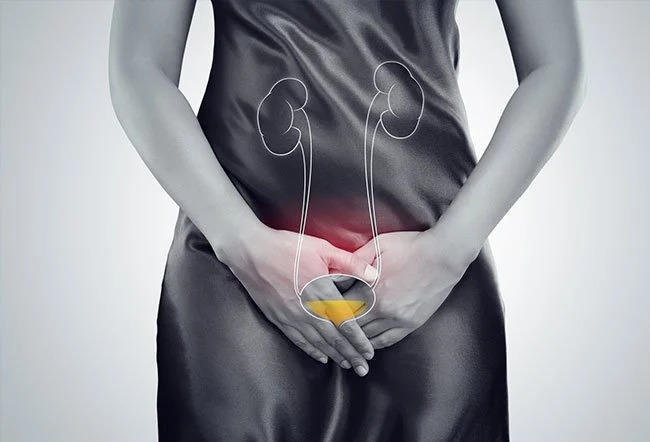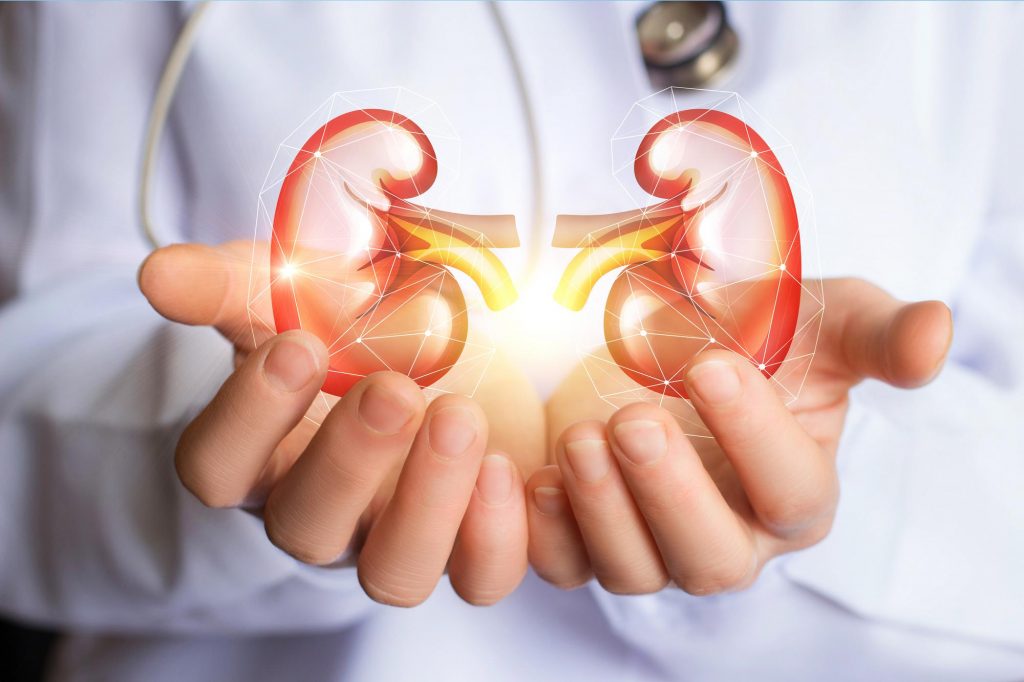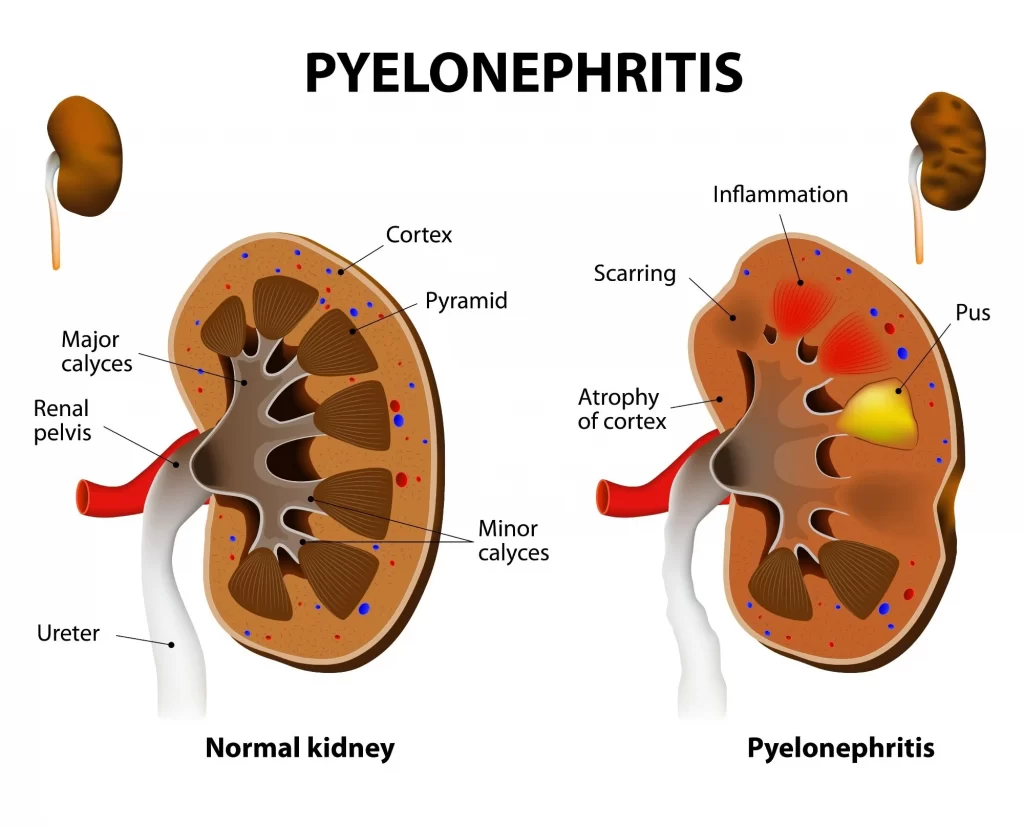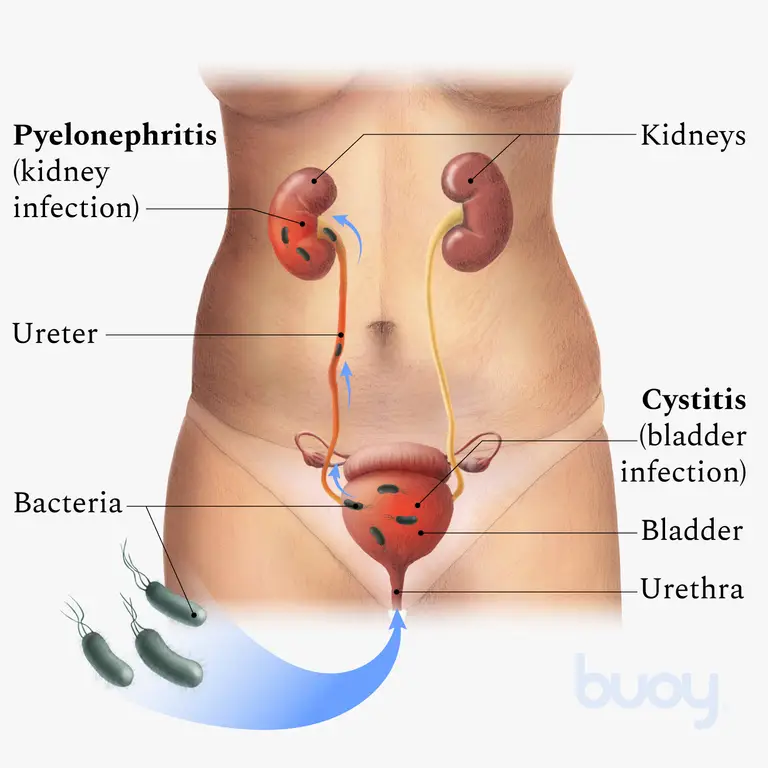Urinary Tract Infection May Damage Your Kidneys!

Your kidneys filter waste from your blood into your urine and regulate the amount of water and electrolytes in your blood. These are both important body functions that routinely keep happening right from our birth till our last breath.
But did you know that renal disease can be fatal, frequently with quite serious consequences, and put you incapable of doing your daily chores? If you are not aware of the effects, reading this post may be very beneficial for you to comprehend the infections that your kidneys might get affected with and the natural treatments you may take to prevent if there is an infection.
Typically, kidney infections are brought on by bacteria that got into your kidneys or bladder through your urinary tract. Infections in other parts of your body, surgery on the kidneys or bladder, or obstacles to the flow of urine like kidney stones, tumours, or enlarged prostates can also cause them.
One or both of your kidneys may eventually get infected with pyelonephritis, also referred to as a kidney infection, as a result of a urinary tract infection. They may come on suddenly or gradually, but they almost always feel awful. They could also be severe and even fatal if untreated.
The narrower urethras of women compared to men have been found to increase the risk of kidney infections in women. It is easier for bacteria to enter the urinary tract because of the close proximity to the anus and vagina. Pregnancy increases this risk factor to a potential extent. Some critical signs consist of:
- Being susceptible to urethral infections
- Experiencing issues with a weaker immune system frequently urinating while totally emptying your bladder
Let’s look into the symptoms
Kidney infection symptoms might differ between children and adults and often present 2 days after the first infection. Typical signs in adults include:
- Burning or pain while peeing blood or pus in your urine cloudy or foul-smelling urine frequent urination or the feeling that you need to urinate
- Nausea or vomiting, smelling urine, fever, and chills
Only a high temperature may be present as a symptom of a kidney infection in children under the age of two. Adults over 65 may only exhibit verbal slurring and mental bewilderment as symptoms.
If a kidney infection is not promptly and effectively treated, symptoms may worsen and lead to sepsis, a condition that poses a serious risk to life. Symptoms of sepsis include:
- Fever confusional rash rapid breathing and heart rate chills
When to seek emergency medical help

Although unpleasant, UTIs do not require immediate medical attention. Some people make the error of assuming that a kidney infection is the same as a cold.
Kidney infections are dangerous illnesses that need to be treated by a doctor. A kidney infection that is left untreated can soon result in kidney scarring or long-term kidney damage. Additionally, these infections may result in sepsis, which may result in septic shock.
As a result, if a kidney infection worsens, it may be fatal. It’s crucial that a medical practitioner treat it right away.
Be aware that kidney stones can obstruct blood flow and induce an infection or sepsis if they are not addressed. A urologist may need to perform a procedure using intravenous antibiotics for this.
Medical care for the Kidney Infections
The first line of defence against a kidney infection is always antibiotics. A doctor will probably prescribe oral antibiotics for you to take once or twice daily for 7 to 14 days if the kidney infection is not severe.
Even if you start feeling better after a few days, it’s still crucial to finish the complete course of antibiotics. Early termination may result in antibiotic resistance or re-infection. Additionally, a doctor might advise you to drink lots of water.
Kidney infections occasionally necessitate hospitalization. Through an IV, you’ll receive intravenous fluids and antibiotics that can both help treat the infection, while your stay at the treatment centre.
To ascertain the extent of the infection as well as its origins, such as a blockage brought on by a kidney stone or anatomical anomaly, more lab work and imaging may be performed.
A doctor will help you identify the reason for your recurrent UTIs, which raise your risk of frequent kidney infections and will assist you in avoiding subsequent infections.
Treatment options at home for kidney infections
Some people favour using supplementary or at-home treatments to treat medical concerns.
You must not rely on home cures because kidney infections can be quite severe. Take the prescribed antibiotics that your doctor has prescribed in lieu of trying home treatments to relieve your symptoms or pain.
Home remedies can also be used to enhance kidney function and prevent UTIs.
1. Sip plenty of water

To help the body flush out bacteria and speed up the healing process, drink plenty of water. Additionally, it can aid in urinary system cleansing.
It’s a healthy habit to continue drinking lots of water because it can help avoid UTIs, which can result in kidney infections. At least eight glasses of fluids each day should be your goal.
2. Have some cranberry juice
Bladder infections and UTIs have traditionally been treated with cranberry juice. There is some evidence to suggest that some people’s UTIs may be treated or avoided by drinking cranberry juice.
Many people pick cranberry juice over water because of its sweet flavour. On the other hand, cranberry juices with additional sweets are bad for you. For the health advantages of cranberries, a cranberry supplement or pure cranberry juice is preferable.
3. Steer clear of coffee and alcohol
The primary function of the kidneys is to remove toxins and toxic chemicals, and both caffeine and alcohol can put additional strain on the kidneys. This might make it harder for an infection to recover.
Avoid drinking while receiving therapy because alcohol and antibiotics shouldn’t be combined.
4. Consume probiotics
When it comes to treating kidney infections, probiotics offer two significant advantages.
The first is that, despite the possibility that antibiotics may eradicate both “good” and “bad” bacteria, they will aid in maintaining the balance of healthy bacteria in your body.
Additionally, there is proof that probiotics can help patients experience less diarrhoea brought on by antibiotics.
Probiotics are available at your neighbourhood supermarket, online, or through subscription services.
5. Consume some vit. C
Strong antioxidants like vitamin C help shield the body’s tissues from oxidative stress, which can support kidney function.
Some animal studies also demonstrate that vitamin C can enhance renal enzymes and reduce kidney scarring during an acute kidney infection.
You can consume meals high in this nutrient or take vitamin C supplements.
6. Have parsley juice
A nutrient-rich diuretic, parsley juice can increase both the frequency and volume of urination. As a result, antibiotics may be even more effective by facilitating the faster flushing out of kidney-resident bacteria.
If you don’t particularly enjoy the taste of parsley, you can blend it with fruits that have strong flavours, such as cranberries or blueberries, for the best results.
7. Eat apples and drink apple juice
Apples contain a lot of nutrients. Their high acid content may aid the kidneys in maintaining urine pH, possibly preventing further bacterial growth.
Additionally, they have anti-inflammatory qualities, which may aid in the recovery of the kidneys from the infection.
8. Take a bath with Epsom salts
Warm water and Epsom salts can both reduce discomfort. While you wait for the antibiotics to work, this can help make the unpleasant kidney infection side effects a little more manageable.
Epsom salts may be beneficial even after symptoms from the kidney infection have subsided because abdominal pain can occasionally be a side effect of antibiotics as well as kidney infections.
9. Take painkillers other than aspirin.
Painkillers without aspirin can ease discomfort. Acetaminophen (Tylenol) and ibuprofen (Motrin, Advil) can also help reduce infection-related fevers.
However, take notice that it’s crucial to avoid nonsteroidal anti-inflammatory medicines (NSAIDs), such as ibuprofen (Motrin, Advil), and naproxen if you have kidney dysfunction or acute kidney injury as a result of a kidney infection (Aleve).
10. Use heat treatment
You can use heat therapy to lessen pain while you wait for the antibiotics to start working. For about 20 minutes at a time, place a heating pad or hot water bottle on the injured area.

11. Apple cider vinegar
Apple cider vinegar is a common ingredient in home remedies, regardless of the illness you’re trying to treat. Due to its antibacterial properties, some people assert that it can also treat kidney infections.
In spite of this, there isn’t any concrete evidence or research to support this.
12. Baking soda may help
Some people believe that using baking soda as a home treatment for kidney infections will assist the kidney’s cleansing by enhancing their ability to filter. This is also a kind of evidence which does not have adequate proof.
On the contrary, attempting to utilize baking soda, for this reason, could possibly be harmful. According to a study, some persons who misused baking soda ended up being admitted to the hospital as a result of electrolyte imbalances, respiratory depression, or metabolic alkalosis.
How to lower your chance of getting kidney infections
Kidney infections can affect anyone. However, since UTIs can develop into kidney infections, reducing your chance of a UTI will reduce your risk of kidney infection. Tips for lowering your risk of UTI include:
- Consuming a lot of liquids
- Front-to-back cleaning of the genitalia
- To avoid retaining your pee after having sex right away.
- Avoiding perfumed douches, pads, and tampons as it affects the vagina, and may start taking probiotic supplements.
Is there a duration of a kidney infection?
Once they’ve been taking the prescribed antibiotics for a few days, the majority of people start to feel better. The normal duration of an antibiotic prescription is two weeks. Even if you start to feel better before the course is over, it’s still crucial to finish it.
Does the colour of your urine alter when you have a kidney infection?
When you have a kidney infection, your urine may occasionally be murky or dark reddish-brown. If you haven’t seen a doctor or received a diagnosis, this is a clear indication that you need to be examined.
How can kidney health be improved in a simple way?
Staying hydrated and engaging in regular exercise are good lifestyle choices that can have a significant positive impact on kidney health.
Similarly, you shouldn’t smoke and you should visit your doctor frequently to get your blood pressure checked. You should test and keep an eye on your kidneys if you’re susceptible to kidney infections.
Last but Important
A doctor’s prescription for antibiotics is necessary right away to address the dangerous condition of a kidney infection.
A doctor should be consulted before using any home remedies to make sure they won’t conflict with your treatment plan. Home remedies can be used as a complementary treatment to assist ease other symptoms.

- Those who have a history of diabetes, heart failure, high blood pressure, anaemia, or any of these conditions. These factors all have the potential to induce inflammation and decrease blood flow to the kidneys.
- If left untreated, kidney damage or disease can arise from sepsis, an infection that slows down blood flow to the kidneys, chronic renal disease, kidney stones (which are common), or any other condition.
- Eating poorly or gaining significant weight or obesity, Lack of vitamins, increased inflammation, electrolyte imbalances, and changes in blood pressure are just a few of the negative effects of a poor diet.
- Being an elderly person. As you become older, more kidney problems become a possibility.
- A history of liver disease, liver damage, or enlargement of the prostate. This affects how the body gets rid of waste and reacts to toxins, drugs, hormones, and/or chemicals.
- Experiencing a stressful event or kidney damage that causes unanticipated blood loss
- A virus that affects electrolyte levels is one disease that causes a low immune response. Extreme emotional stress, recurrent infections, and weariness can all reduce immunity.
- Undergoing treatment in a hospital or critical care unit after having surgery, an organ transplant, or a bone marrow transplant.
- Utilizing prescription drugs such as ACE inhibitors, painkillers, blood pressure medications, and antibiotics may occasionally result in kidney problems.
- Reducing dehydration and reestablishing electrolyte equilibrium. Intravenous fluids may occasionally be given to patients to rehydrate them. If there is fluid retention and oedema, diuretics can also be taken.
- Often changes in any or all the medications might be causing the problem.
- If the obstruction is preventing the patient from urinating, removing it will relieve their symptoms.
- Treating any infection with signs of life, including sepsis and infections of the digestive system in general
- Start a dialysis programme under medical supervision if necessary.
- Suggesting medication to control glucose, calcium, sodium, or potassium levels. The drugs Kayexalate and Kionex stop the blood’s potassium levels from rising too high.
- If required, begin a dialysis program under medical supervision.
- Possibly recommending drugs to regulate sodium, potassium, calcium, or glucose levels. The medications Kayexalate and Kionex prevent the buildup of excessive potassium levels in your blood.

Disclaimer: This information is for educational purposes only, and no medical advice should be inferred from it. Before changing your diet or adding supplements, please talk to your doctor.
The author’s views are his or her own. The facts and opinions in the article have been taken from various articles and commentaries available in the online media and Eastside Writers does not take any responsibility or obligation for them.
Note: Contact our Writers at www.eastsidewriters.com for writing Blogs/Articles on any niche. We have experts in various domains from Technology to Finance and from Spirituality to Lifestyle and Entertainment.







Pingback: Chronic Kidney disease- the Risk Factors and Treatment - Eastside Writers
Pingback: Shilajit- It's Unknown And Untold Wonders in Your Well-Being - Eastside Writers
Pingback: Is Masturbation Bad For Growing Child- How To Get Rid Of This Menace - Eastside Writers
Pingback: Secrets And Surprising Benefits Of Consuming Cloves On Your Health - Eastside Writers
Pingback: The Negative Impact of Alcohol Consumption: How Excessive Drinking Harms Our Body - Eastside Writers
Pingback: Beyond Water Retention: Uncovering the Surprising Truths of Diuretics - Eastside Writers
Pingback: Trapped: The Painful Truth About Phimosis and Its Hidden Dangers - Eastside Writers